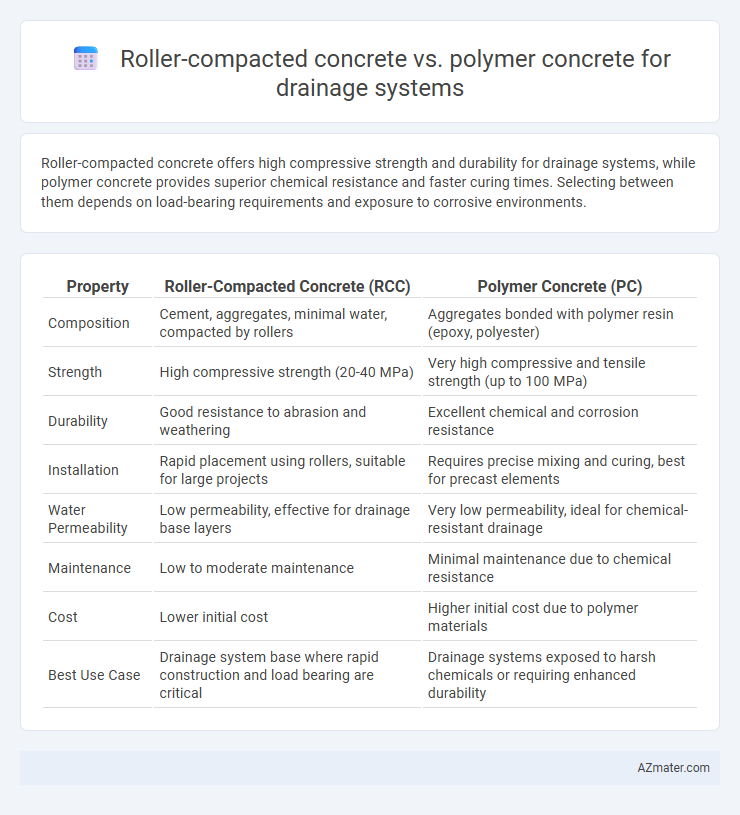Roller-compacted concrete offers high compressive strength and durability for drainage systems, while polymer concrete provides superior chemical resistance and faster curing times. Selecting between them depends on load-bearing requirements and exposure to corrosive environments.
Table of Comparison
| Property | Roller-Compacted Concrete (RCC) | Polymer Concrete (PC) |
|---|---|---|
| Composition | Cement, aggregates, minimal water, compacted by rollers | Aggregates bonded with polymer resin (epoxy, polyester) |
| Strength | High compressive strength (20-40 MPa) | Very high compressive and tensile strength (up to 100 MPa) |
| Durability | Good resistance to abrasion and weathering | Excellent chemical and corrosion resistance |
| Installation | Rapid placement using rollers, suitable for large projects | Requires precise mixing and curing, best for precast elements |
| Water Permeability | Low permeability, effective for drainage base layers | Very low permeability, ideal for chemical-resistant drainage |
| Maintenance | Low to moderate maintenance | Minimal maintenance due to chemical resistance |
| Cost | Lower initial cost | Higher initial cost due to polymer materials |
| Best Use Case | Drainage system base where rapid construction and load bearing are critical | Drainage systems exposed to harsh chemicals or requiring enhanced durability |
Introduction to Drainage System Materials
Drainage system materials require high durability, water resistance, and structural integrity to efficiently manage runoff and prevent erosion. Roller-compacted concrete (RCC) offers high compressive strength and rapid placement, ideal for large-scale infrastructure with heavy load demands. Polymer concrete provides enhanced chemical resistance and improved durability in corrosive environments, making it suitable for specialized drainage applications requiring long-term performance.
Overview of Roller-compacted Concrete (RCC)
Roller-compacted concrete (RCC) is a durable, high-strength material composed of a low cement content concrete mix compacted with heavy rollers, widely used in drainage systems for its rapid construction and excellent load-bearing capacity. Its dense, impermeable structure offers superior resistance to abrasion, erosion, and harsh weather conditions, making it ideal for channels, culverts, and stormwater management. RCC enables cost-effective, large-scale applications with minimal curing time, outperforming traditional concrete in terms of speed and longevity for infrastructure projects.
Overview of Polymer Concrete
Polymer concrete, composed of aggregates bound by synthetic resins, offers excellent chemical resistance and low permeability ideal for drainage systems exposed to aggressive environments. Its rapid curing time and superior bonding strength enable durable, maintenance-free installations compared to conventional roller-compacted concrete. The composite's lightweight nature and resistance to corrosion make it a preferred choice for long-term infrastructure performance in drainage applications.
Material Composition Comparison
Roller-compacted concrete (RCC) consists primarily of a low-slump concrete mixture with cement, aggregates, and water, designed for high-density compaction without traditional formwork. Polymer concrete incorporates polymers as a binder instead of cement, combining aggregates with resins like epoxy or polyester to enhance chemical resistance and durability. Compared to RCC, polymer concrete offers superior resistance to chemical corrosion and water infiltration, making it ideal for drainage systems exposed to aggressive environments, while RCC provides higher structural strength and cost efficiency for large-scale applications.
Structural Strength and Durability
Roller-compacted concrete (RCC) offers high structural strength due to its dense matrix and low water-cement ratio, making it ideal for heavy-load drainage systems with enhanced durability against mechanical wear. Polymer concrete exhibits superior chemical resistance and durability in aggressive environments, preventing degradation from corrosive substances commonly found in drainage applications. While RCC excels in load-bearing capacity, polymer concrete provides long-term performance in chemically aggressive settings, making both materials viable depending on specific drainage system requirements.
Installation Process and Construction Speed
Roller-compacted concrete (RCC) offers rapid installation due to its dry consistency, enabling fast compaction with heavy machinery and reducing curing time significantly. Polymer concrete provides a quick-setting alternative with superior chemical resistance, allowing installation in aggressive environments but often requires meticulous surface preparation and specialized curing conditions. The choice between RCC and polymer concrete for drainage systems hinges on balancing construction speed with site-specific environmental demands and required durability.
Cost Analysis and Lifecycle Value
Roller-compacted concrete offers a lower initial cost due to its simpler placement and rapid curing, making it economically advantageous for large-scale drainage systems. Polymer concrete, while more expensive upfront, provides superior chemical resistance and a longer lifecycle, reducing maintenance and replacement costs over time. Evaluating lifecycle value, polymer concrete often delivers better overall savings despite higher initial expenses due to enhanced durability in harsh environmental conditions.
Resistance to Chemical and Environmental Exposure
Roller-compacted concrete (RCC) demonstrates strong durability against abrasive forces but can be susceptible to chemical degradation from sulfates and acidic environments unless specially treated. Polymer concrete exhibits superior chemical resistance due to its resin matrix, effectively withstanding harsh wastewater contaminants and aggressive industrial chemicals. For drainage systems exposed to corrosive substances and fluctuating environmental conditions, polymer concrete provides enhanced longevity and reduced maintenance compared to traditional RCC.
Maintenance Requirements and Longevity
Roller-compacted concrete (RCC) offers superior durability and requires minimal maintenance due to its dense, low-permeability structure, ideal for high-load drainage systems. Polymer concrete, characterized by chemical resistance and flexibility, excels in environments with aggressive chemicals but demands more frequent inspections and repairs to maintain integrity. RCC typically provides longer service life in standard drainage applications, while polymer concrete is preferred for specialized, corrosive conditions despite higher maintenance needs.
Best Applications for RCC vs Polymer Concrete
Roller-compacted concrete (RCC) is best suited for large-scale drainage systems requiring high durability, rapid construction, and heavy load-bearing capacity, such as highways and industrial drainage channels. Polymer concrete excels in chemical resistance and is ideal for corrosive environments like wastewater treatment plants and industrial drainage systems exposed to aggressive chemicals. Selecting between RCC and polymer concrete depends on factors like load requirements, environmental conditions, and exposure to chemical agents.

Infographic: Roller-compacted concrete vs Polymer concrete for Drainage system
 azmater.com
azmater.com